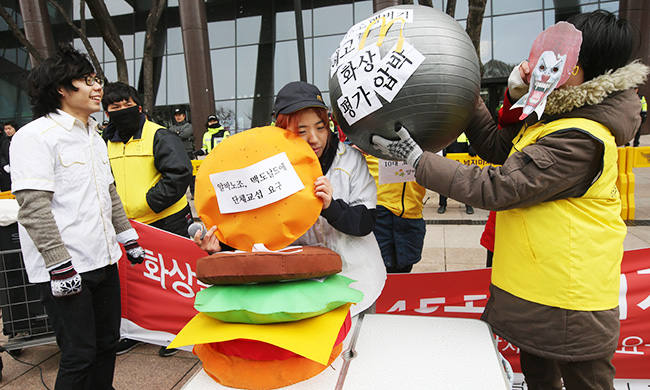- California Assembly OKs highest minimum wage in nation
- S. Korea unveils first graphic cigarette warnings
- US joins with South Korea, Japan in bid to deter North Korea
- LPGA golfer Chun In-gee finally back in action
- S. Korea won’t be top seed in final World Cup qualification round
- US men’s soccer misses 2nd straight Olympics
- US back on track in qualifying with 4-0 win over Guatemala
- High-intensity workout injuries spawn cottage industry
- CDC expands range of Zika mosquitoes into parts of Northeast
- Who knew? ‘The Walking Dead’ is helping families connect
Part-timers call for McDonald’s to scrap 45-second rule on making burgers in S. Korea

Members of the Arbeit Workers Union, representing part-time workers, stage a performance urging McDonald’s Korea to scrap its “45 second rule” on making burgers, among other demands, in front of the fast food chain’s office in Gwanghwamun, downtown Seoul, Monday. The union called for a collective bargaining session with the company on the issues. (Yonhap)
By Kim Bo-eun
Lee Ga-hyun, 22, has a burn on her arm, which she sustained while working for a year at a McDonald’s store in Bucheon, Gyeonggi Province. Her position was at the grill, which meant she was in charge of making burgers, and she vividly recalls the time limit imposed on workers.
According to Lee, the fast food chain requires workers to wash their hands in 20 seconds, warm up buns and place them on wrapping paper in 25 seconds and make the burger in 12 to 20 seconds. This means the process takes a maximum of 45 seconds.
“I was always in a rush. I got scolded by my trainer if the process took longer,” Lee told The Korea Times in a phone interview.
“In the hectic process, it was not unusual for workers to get injured such as getting burns and slipping on the greasy floor.”
According to data from the Arbeit Workers Union, 80.6 percent of workers in fast food chains had either injured themselves or saw colleagues get injured. For 28.6 percent of them, the store did not take any compensatory measures.
Such harsh working conditions got the union to stage a press conference in front of the McDonald’s Korea office in Jongno-gu, central Seoul, Monday.
The union called for the fast food chain to scrap its time limit, among other demands, claiming it causes work-related accidents.
It also urged Cho Ju-yeon, the new president of McDonald’s Korea to start collective bargaining with them over the issues.
However, McDonald’s Korea said “keeping the time limit is not a must; it exists as a guideline to bring warm food to customers.”
“There are no penalties for failing to ahere to it,” it added.
Lee tells a different story.
She recalls having been taught about the 45 second rule during training sessions when she started. In the kitchen, workers are pressured to keep the time limit as they see colors on a screen in front of them change to red if they are running late.
The store keeps a record of the time workers take to make the burgers and evaluates them based on how well they meet the time limit, she said.
“If the worker continues to fail to meet the time limit, their hours are reduced, which in the end will leave them with no choice but to quit,” Lee said.
But this is not the only factor that irks workers. They say there is discrimination within the workplace according to position, which they have labeled the “burger caste system.”
Lee says there are three levels _ crew, trainer and manager and they get differentiated meals according to their level.
Lee, who was a crew member, said “I felt discriminated against and deprived.”
With regards to this matter, McDonald’s Korea said “the division is based on how many hours the workers work per day.”
If they work less than four hours, they are given a smaller burger and if they work longer than four hours, they are provided a larger one, it said.
The company did concede, however, that it “offers a greater variety of options to those who have worked longer.”












![일본 사도광산 [서경덕 교수 제공. 재판매 및 DB 금지]](http://www.koreatimesus.com/wp-content/uploads/2024/07/PYH2024072610800050400_P4-copy-120x134.jpg)


